The JRB presents new short fiction by Contributing Editor Henrietta Rose-Innes.
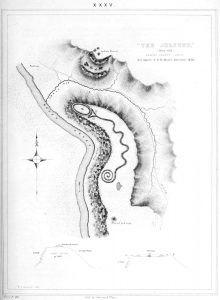
Author’s note:
I began to write this Twitter story some months ago, when I was feeling stuck. I’ve always been a cautious writer, given to much rewriting and second-guessing; also a secretive soul who hates to show her working. But I needed to try something new, something fast and fun (i.e. venom, arson and anachronistic military uniforms), and for this, Twitter is an excellent machine. I resolved not to think ahead beyond 140 characters (then disconcertingly 280); to release each paragraph to the world as soon as it took form, with little time to think and no chance to go back and fix. I’d write into the dark, unsure what path I was beating through what odd landscapes, or why. ‘Snake Story’ may turn out to be a fantasy novella, or perhaps it will wind on aimlessly forever. Eventually, though, I do hope to make it eat its own tail. It would be lovely to have company on the road ahead: follow on @FarMonolith.
~~~
Snake Story
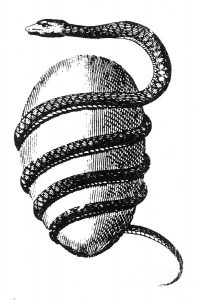
Begin again. This morning, fires in the hills. I’m up in the dark, packing a bag. A knife, a piece of cheese, binoculars. Time to run.
I let the snakes out first. The smallest, the glossy brown, I put her in my pocket with the coins and go outside. In the streetlamp light, the neighbours are out on their lawns, with their bags and suitcases and cat-carriers piled around them. The darkness smells of smoke. The wind’s changed; above the town, a line of fire is feeling its way down. The little snake tightens around my wrist.
The woman from next door calls out something to me but I don’t stop. She doesn’t seem herself, her hair undone and makeup off, the children staring. Their dog comes after me until the end of the street, watches until it’s sure I’ve turned the corner. I walk on until I hit the highway.
We’re on our own now, snake and me.
Heading down the black road, hillfires at my back. Hands in pockets, singing a serpent song. I feel my slender companion prick my wrist, just lightly, and the zing of it jolts me on.
At first my breath makes mist; but soon I am too cold even for that. This, always, is what I was made for: the black road, all human warmth left leagues behind. The only light I need from coldly luminescent things: the white centre-line; white thorns on the small trees to either side; the pale bodies of skinks, of moths, all crouched and silent. I see them with my venom-boosted eye.
It’s not like I haven’t done this before. We handlers are always leaving, shedding skins, wriggling out of them and moving on. The camouflage is never good enough, not forever; someone will see you in the end. My only sorrow is to leave behind my elegant charges. When the sun warms their backs, they’ll wake and wind from their tanks, flow through the doors and windows I left ajar, and out into the world. Disappearing slantwise into cracks and crevices, keeping ahead of the flames. As I am doing now.
I start to jog, for the warmth of it, and my snake-charms jingle and chime. The heavier ones at my ankles make a sound like shaken keys. At my wrists, they are more delicate—some contain small moving parts—and they have a lighter sound, like the bells on cat-collars. Most times, a snake handler is quiet and still, but watch out when we start to rattle. It’s a dance, with bells and percussion; my limbs move on their own. I forget that I’m running, or that I’m chased. I don’t hear the car.
It’s an old vehicle that pulls up beside me: a battered, top-heavy four-wheel-drive, but sprayed blue-green, metallic, like no Land Rover ever. The face that peers at me through the driver’s window is vivid, with black brows and blood lips. Pale face nested in dark hair. It makes me think, for moment, that she’s got a bit of snake in her too—we tend to the dramatic. But as soon as I get close and catch the scent, I know the driver is too blood-hot to be one of us. And too nervous.
‘Need a ride?’ she asks. ‘Where you headed?’
I press the pointed ends of my tongue together, but I’m out of practice; she’ll hear the telltale lisp. I’m headed for Steyn, the next town along, but what I say is: anywhere.
Under my shirt, the snake is on the move, burrowing up my loose sleeve. Her snout pokes from my collar. She licks the air, cautious, then lays her head against my jugular for comfort. The driver notices nothing.
I’m tired. We have not yet fully woken from the long sleep. I go still, sink down a level, alert only only to light flickers of sensation.
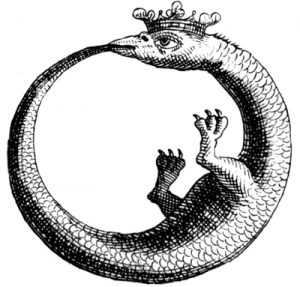
But I can smell something. Children. Two asleep on the back seat; no, three. One a baby. In this state I can taste their dreams—full of fire and hissing shadows.
The woman’s uneasy, chatty. ‘What’s your name? I’m Leah.’
Watch the road, I think.
Franny—first thing that comes to mind.
‘Really? That’s my daughter’s name! What a coincidence.’
Shit. Must be more careful. I pluck my drowsy mind away from the sleeping kids. Huh.
I turn away. Through the window, I see a gout of fire erupting on the crest of the black hillside. Sinuous, fast; racing to catch us. The children’s faces are bathed in red. Leah moans, clutches the wheel. I bring to mind my maps.
Turnoff ahead to the right.
It’s a dirt track. Leah hesitates: ‘You sure?’
Just drive. I’m careless of sibilance now. There’s a ferry.
The car blunders down the potholed track, too fast. The air cools as we leave the fire behind and descend towards the river. Dawn is coming: pale light touches the peaks. It’s high, cold country up there, other side the water. The valley will be in darkness for another hour still.
Zigzag, zig and staggering zag down the wrecked dirt road we go. We almost make it to the bottom when something gives; the car swerves sickly. Leah yelps and stamps the brakes; we slew to a halt. She turns off the engine and a great silence reasserts itself.
‘Shit shit SHIT,’ she whimpers.
I get out and look: tyre shredded. Damn, it’s cold.
Weird. The kids must be awake by now, but not a peep out of them. I poke my head into the car and observe their blanketed forms.
Leah is babbling. ‘What’s broken?’
It’s fine. Just a tyre.
I slide my hand up under my shirt, feel round the back, but I know what’s wrong. No snake. Snake’s gone. While I was dreaming in the passenger seat, she unloosed her grip and slithered away. Not far, though—I can still smell her.
The children, lying so still. And quiet. As mice.
Breathing? Yes, at least one is—her chest rises. The other two snug under the blanket. Snakes do like the warmth.
Leah’s out of the car and talking at me, frantic: ‘It isn’t there, I looked.’
What?
‘A spare. There’s no spare tyre.’
Christ. I look at her: a tall woman, but weak.
Can’t be far. You carry the baby. I’ll take the girl. The other walks.
I’m relieved when the oldest boy climbs sleepily out. Leah hugs the baby—all well. But the middle kid … so slack in my arms. I peek at her face. Her skin is very pale. I give her a sly shake. Come on, kid. Not this. Let me not find two bright pricks of red on your soft arm.
And then she spasms. Clutches me and presses her face hard against my neck, groaning –
No, not a groan. A chuckle. ‘It tickles!’
I let out a hiss of annoyance and dump the child on her feet. Cursed serpent! She’s got it, it’s in her clothes. But not biting. Playing.
Give it to me.
But the kid just laughs and skips off into the dark. ‘Mom!’
‘Down this way!’ the woman calls. ‘I can see the river!’
We catch up. The ferry terminal is open: lights and movement down there. Pearl mist hangs over the water, hiding the far bank, but the figures standing on the shore are clear in the the floodlights. They’re known to me. The peaked caps, the guns, the tense upright bearings. I look for one shape in particular, and find it. Him.
The Long Blue Colonel is here, he’s come. How has he travelled so fast? I let out my breath in a white cloud. That man, he brings the cold.
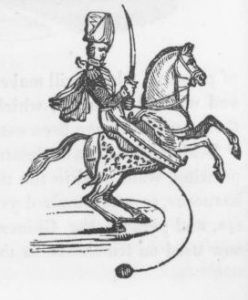
Wait—
But Leah and her children are already hurrying downslope to the jetty. Others are clustered there, maybe a hundred.
‘Come on,’ she calls. ‘They’ll go without us!’
Shut up, I want to say, be quiet.
But a diesel engine coughs awake, booming through the mist. She’s right. They’re leaving. Fuckit. I scramble down the muddy track after them. A sentry watches our descent.
Useless, anyway. I can see from here that the boat’s too small, the people too many, crowding the jetty. Soldiers push back. A man staggers, slips in the mud. A murmur goes up from the crowd. I’ve lost sight of Leah. I push forward, peering at faces. Ducking past soldiers. Where’s that child? Her face is a blur to me, but I sniff out her smell: juice, sleep, crayon, pee. Where is she? The one who’s got what’s mine.
They’re loading. The crowd presses forward, the lucky ones scrambling up the gangplank. Is that them? I see the woman turn, just before she steps aboard: one child on her hip, one held by the hand. The little girl, she smiles at me. Her dark eyes know. The diesel engine roars. The gangplank’s pulled back, the mooring ropes released. The soldiers form a barrier line. Behind them, the ferry eases away from the dock and points its nose downstream. Putting water between us.
The people press at me. They stink of fear. I shoulder my way out the crowd, angle up the hillside into the bush. Best to hide. I find a hollow at the foot of a gnarled boulder. Below, raised voices. But there’s too few of them—no chance against the Colonel’s soldiers. Someone’s knocked to the ground and a woman shrieks; but no shots fired. Soon the people are retreating, trudging defeated back into the mist. The soldiers climb into the back of a truck and it grinds upstream, along a rough track into the trees.
I don’t see the Colonel; he must have left earlier. Only two sentries remain. They share a cigarette on the dock. Sun’s up now. Time to sleep. There’s a lizard snugged into a crack in the rock next to my face. Can’t see him but I can smell, and I send a cautious greeting. His throat pulses: wait.
But I can’t find stillness. I feel the loss of my serpent child. She is travelling over water, away from me, in a stranger’s pocket. Long time since I was last alone like this. It aches.
I didn’t raise her from the egg. I found her in a smoking field, back in the woodcutter’s town. They were burning the stumps, and I picked her from the ashes. Slim as a knife, a fluid stiletto. River-water gold and brown. She knew me at once. Playful, cool-skinned, bitey. I took her for mine.
I should go at once, find a boat—the Colonel’s great barge, it must be anchored here—and follow. But something keeps me.
Something … something wrong, undone, left behind … I ponder. Find the cheese in my pocket, eat it. Let my eyes slit closed and my breathing slow. Time enough. Answers will come. I press myself deeper into the crack of shade under the boulder. Forgive me. From the lizard, no reply.
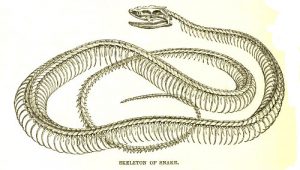
I wake at noon, alert. Creep up to the top of my boulder and lie for a moment with my belly pressed to the rock, soaking up the heat. Bright sky. I’m empty; hungry. Below, the riverbank is deserted, only the scuffed sand recalling last night’s crowd. I stretch, and cautiously pick my way down. Sniffing the breeze. Peckish.
Beyond the jetty, there’s a patch of marshy bank. A creek spools into the main stream here, leaving behind pieces of itself in shallow pools and rills. Marsh grass, bullrushes, mud stench, tiny brown birds weaving their baskets in the reeds.
Off with the boots—always better bare-soled—and in I wade. The speckled weaver-eggs are small as acorns and cannily hidden among the reeds, but I sniff them out. A long-legged heron follows me, hoping for scraps. I’m not like some of my kind, who eat two or three meals a month, and those fat feasts to last them through. Not right now, at any rate. I’ve got to move fast. No week-long sleeps for me, not till this road is run. Eggs and frogs, that’ll do me. And fieldmice, crickets: all the light-boned nervous things, the ones with sharp-sharp senses. I crack the eggs straight into my mouth, and soon I’ve got a dozen down. Already I’ve got more energy. Thinking better, moving quick and right. I splash back to dry land, senses alight. I know now what was bothering me, earlier; what I’d missed.
The woman. Lena? Leah? I lose names quickly … her. The children. One two three. But she’d only had two on the boat: the baby, the thieving girl. There was one left behind. I stand still, moving my head slowly side to side, scanning for a scent. The boy, the oldest child. I hadn’t paid him mind. But he’s here.
Not close, though. Or close, but very weak. His molecules dispersing, his heat-trace all but gone; too faint, even for me. But there’s something in it that touches me. He’s calling.
I hiss in impatience, shake my head. Leave the boy, that’s not your road. Your road is the river. I bring to mind my little lost snake, the sleek diamond of her head unblemished by ears, and I shut out the human voice. Shh. Shhhssstssst.
The sentries have gone from their post, and it worries me. I think it means they’re moving out. If I’m going to catch a ride, I better run. I jog up the wooded path the soldiers took.
Not sure what I’ll do when I find them. The Colonel’s as likely to shoot me as take me along. We parted enemies, as I recall; but he and I have been a few turns around the wheel together now. Skins get shed, the memories don’t always renew. It’s how it is, for us. Anyway. Can’t say I’m not intrigued to see the old blue devil again. Coldest human I know, which gives us something in common I suppose.
There now. Through the trees it comes: a hoarse command, a shudder in the soil as a phalanx of boots are brought down together, muffled by pine needles but still emphatic. TEN … SHUN! I come to the edge of clearing and see them lined up in their uniformed glory, bluebell bright. Ah, my Colonel. Sticking to the drill, even in these burning days.
He’s there, at the head of his troops, his tall back unmistakeable. In his hand he holds a sword, unsheathed. That’s his thing. It should be laughable but the light off its blade slices into me; I feel it across my neck.
Stupid, stupid, shouldn’t have come. I step back into the trees. Quickly I remove the jangling charms from my wrists and ankles, knot them into the hem of my shirt. A faint animal track seems to lead round the back of the fort, out of sight. I take it at a run, bare soles silent on the mulch.
But not as silent as the two soldiers who step into my path. One takes me down with an arm to the throat; the other puts his knee on my chest and his gun to my head.
No point in fighting. They know what they’re doing: they have the cuffs, the muzzle, the high-voltage tasers. While the one straps my legs, the other keeps me down with a four-foot metal pole. The forked end is jammed against my neck, I can’t move my head. I lie quiet. Been here before, too. But he digs it in.
Hey. Hey, sto—
But this soldier, he’s not stopping. No, STOP—
I scrabble at the metal yoke. He’s supposed to stop now but he doesn’t, he won’t, he’s leaning in, he’s putting his weight into it and I’m gasping SStaa aggah but there’s no air and it’s crushing my throat like STAAaa like sttgh like sss ssghhsss … the pain in my chest like some deep vital bone’s about to snap and I haul and haul for breath that isn’t there as the soldier leans over me and gathers spit and lets it fall into my face.
‘Fucking snake,’ he says.
To be continued …
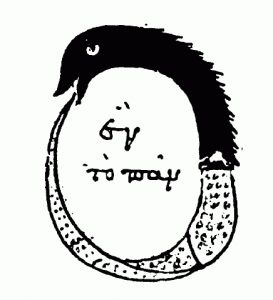
- Henrietta Rose-Innes is the author of the novels Shark’s Egg, The Rock Alphabet, Nineveh and Green Lion, and the short-story collection Homing. She was awarded the South African PEN Literary Award in 2007 and won the Caine Prize for African Writing the following year. Nineveh was shortlisted for the 2012 Sunday Times Fiction Prize and an M-Net Literary Award. Her short stories have appeared in various international publications, including Granta, AGNI and The Best American Nonrequired Reading 2011, and her work has been translated into several languages. In 2015, the French translation of Nineveh won the François Sommer Literary Prize. Follow her on Twitter.
© Henrietta Rose-Innes, 2017


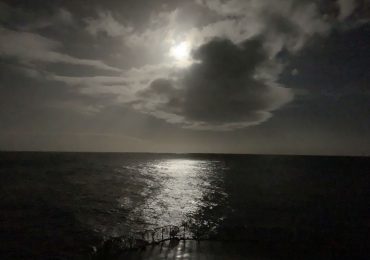
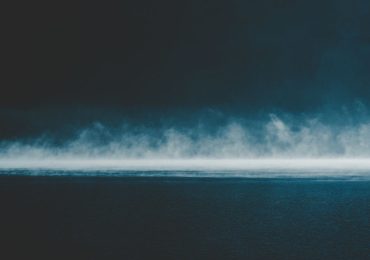
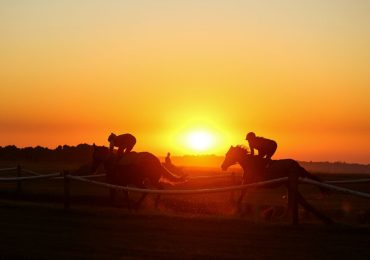

3 thoughts on “[Fiction issue] ‘Snake Story’, new short fiction by Henrietta Rose-Innes”